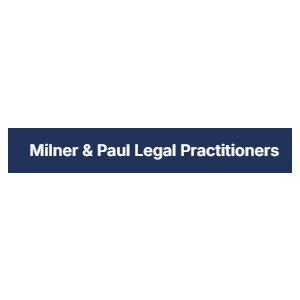Best Land Use & Zoning Lawyers in Lusaka
Share your needs with us, get contacted by law firms.
Free. Takes 2 min.
Free Guide to Hiring a Real Estate Lawyer
List of the best lawyers in Lusaka, Zambia
About Land Use & Zoning Law in Lusaka, Zambia:
Land Use & Zoning Law in Lusaka, Zambia governs how land is utilized and developed within the city. These laws help regulate the use of land for residential, commercial, industrial, and public purposes. Zoning regulations determine what type of activities can take place in specific areas, ensuring orderly development and protecting the environment. It is essential to understand these laws to comply with regulations and avoid legal issues.
Why You May Need a Lawyer:
You may need a lawyer specializing in Land Use & Zoning in Lusaka, Zambia if you are facing issues such as property disputes, zoning violations, obtaining permits for development projects, rezoning applications, or understanding local regulations. A lawyer can provide legal advice, represent you in legal proceedings, and help navigate the complexities of land use and zoning laws in Lusaka.
Local Laws Overview:
In Lusaka, Zambia, the Town and Country Planning Act and the Local Government Act are two key pieces of legislation governing Land Use & Zoning. These laws outline the development control process, zoning regulations, land use planning, and environmental considerations. It is crucial to comply with these laws to avoid penalties and ensure sustainable development in Lusaka.
Frequently Asked Questions:
1. What is the purpose of zoning regulations in Lusaka, Zambia?
Zoning regulations in Lusaka determine how land can be used in different areas to promote orderly development, protect the environment, and ensure compatibility between land uses.
2. How can I obtain a zoning permit for my development project in Lusaka?
To obtain a zoning permit in Lusaka, you must submit an application to the local planning authority, detailing your project's compliance with zoning regulations and land use requirements.
3. What are the consequences of violating zoning regulations in Lusaka?
Violating zoning regulations in Lusaka can result in fines, penalties, enforcement actions, or even the demolition of unauthorized structures. It is essential to comply with zoning laws to avoid legal issues.
4. Can I request a rezoning of my property in Lusaka?
Yes, you can request a rezoning of your property in Lusaka by submitting a rezoning application to the local planning authority, outlining the reasons for the requested change and how it complies with the city's development goals.
5. How can a lawyer help me with a land use dispute in Lusaka?
A lawyer specializing in Land Use & Zoning in Lusaka can provide legal advice, represent you in negotiations or legal proceedings, and help resolve land use disputes through mediation, arbitration, or litigation.
6. What are the key environmental considerations in land use planning in Lusaka?
Environmental considerations in land use planning in Lusaka include minimizing pollution, protecting natural resources, conserving biodiversity, and promoting sustainable development practices to ensure a healthy environment for future generations.
7. Are there any restrictions on building heights or density in certain areas of Lusaka?
Yes, there are restrictions on building heights, density, and floor area ratios in different zones of Lusaka to ensure appropriate development, prevent overcrowding, and maintain the city's aesthetic appeal.
8. How can I appeal a zoning decision in Lusaka?
You can appeal a zoning decision in Lusaka by submitting an appeal to the local planning authority within a specified timeframe, stating the grounds for your appeal and providing supporting documentation or evidence to support your case.
9. Can I subdivide my property in Lusaka for multiple developments?
Yes, you can subdivide your property in Lusaka for multiple developments, but you must comply with subdivision regulations, obtain approval from the local planning authority, and ensure that the new developments meet zoning requirements.
10. How can I stay informed about changes in Land Use & Zoning laws in Lusaka?
You can stay informed about changes in Land Use & Zoning laws in Lusaka by regularly checking the official website of the local planning authority, attending public meetings or consultations, or seeking advice from legal professionals specializing in this field.
Additional Resources:
1. Lusaka City Council: http://www.lcc.gov.zm
The Lusaka City Council provides information on zoning regulations, development control, permits, and other land use planning matters in Lusaka, Zambia.
2. Ministry of Local Government and Housing: http://www.mlgh.gov.zm
The Ministry of Local Government and Housing oversees land use planning, urban development, and local government administration in Zambia, providing valuable resources and guidance on Land Use & Zoning laws.
Next Steps:
If you require legal assistance with Land Use & Zoning in Lusaka, Zambia, consider consulting with a lawyer specializing in this field to understand your rights, obligations, and options. Be prepared to provide relevant documents, details of your case, and any correspondence with the local planning authority to facilitate the legal process efficiently.
Lawzana helps you find the best lawyers and law firms in Lusaka through a curated and pre-screened list of qualified legal professionals. Our platform offers rankings and detailed profiles of attorneys and law firms, allowing you to compare based on practice areas, including Land Use & Zoning, experience, and client feedback.
Each profile includes a description of the firm's areas of practice, client reviews, team members and partners, year of establishment, spoken languages, office locations, contact information, social media presence, and any published articles or resources. Most firms on our platform speak English and are experienced in both local and international legal matters.
Get a quote from top-rated law firms in Lusaka, Zambia — quickly, securely, and without unnecessary hassle.
Disclaimer:
The information provided on this page is for general informational purposes only and does not constitute legal advice. While we strive to ensure the accuracy and relevance of the content, legal information may change over time, and interpretations of the law can vary. You should always consult with a qualified legal professional for advice specific to your situation.
We disclaim all liability for actions taken or not taken based on the content of this page. If you believe any information is incorrect or outdated, please contact us, and we will review and update it where appropriate.
















